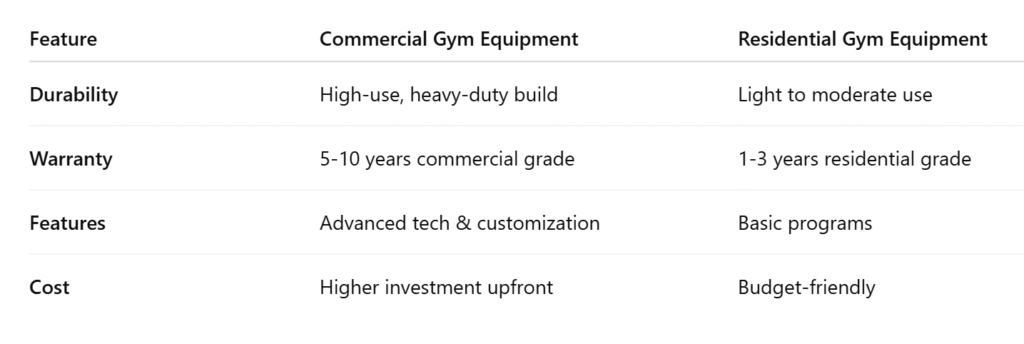Opening a fitness center is an exciting venture, but one of the biggest challenges is selecting the right commercial gym equipment. The right choices ensure your gym appeals to your target audience, maximizes space, and lasts for years. This guide will walk you through the types, classifications, and key factors to consider when building your fitness center.
Why Choosing the Right Fitness Center Equipment Matters
Investing in high-quality gym machines isn’t just about aesthetics. It impacts:
- Member Retention: Modern, functional equipment keeps clients coming back.
- Safety: Robust commercial machines minimize the risk of injuries.
- Longevity: Industrial-grade fitness center equipment withstands heavy use.
- Brand Image: High-end gear positions your gym as a premium facility.
Types of Commercial Gym Equipment
When selecting equipment, it’s helpful to understand the different types and classifications available:
Cardio Machines
Cardio is the foundation of fitness routines.
- Examples: Treadmills, ellipticals, stationary bikes, stair climbers
- Features: Heart-rate monitors, pre-set workout programs, Bluetooth connectivity
- Best for: Weight loss, endurance, and beginner-friendly workouts
Strength Training Equipment
Essential for muscle building and toning.
- Examples: Smith machines, power racks, cable crossovers
- Classifications: Plate-loaded vs selectorized machines
- Best for: Bodybuilding zones, functional strength, and PT sessions
Free Weights & Accessories
Examples: Dumbbells, barbells, kettlebells, benches
Why include: Encourages natural movement and stabilization
Best for: Strength and hypertrophy training
Functional Training Equipment
Functional fitness is a growing trend in 2025.
Examples: TRX suspension systems, medicine balls, resistance bands
Uses: CrossFit, HIIT, rehabilitation
Recovery & Wellness Zones
Modern gyms include recovery spaces.
- Examples: Foam rollers, massage chairs, stretching rigs
- Why important: Boosts member satisfaction and injury prevention
Factors to Consider When Selecting Gym Equipment
Choosing fitness center equipment isn’t just about price or looks. Focus on these key selection criteria:
1. Space and Layout Planning
- Measure your gym floor area.
- Create dedicated zones: cardio, strength, functional, recovery.
- Leave enough space for safe movement and accessibility.
2. Audience & Gym Type
- Boutique gyms: Prioritize functional and multi-use machines.
- Rehab centers: Focus on low-impact cardio and adjustable resistance machines.
- Commercial gyms: Include variety for all levels, from beginners to athletes.
3. Quality & Durability
- Look for industrial-grade steel frames.
- Ensure equipment complies with safety certifications.
- Opt for brands offering warranty (5-10 years) and strong after-sales service.
4. Technology Integration
Modern users love connected fitness:
- Touchscreens with virtual trainers
- App integration (Zwift, MyFitnessPal)
- Performance tracking & live classes
5. Budget & ROI (Return on Investment)
- Prioritize core machines first (treadmills, squat racks, bikes).
- Buy in bulk for discounts from commercial suppliers.
- Consider leasing options for premium machines.
6. Maintenance & Serviceability
- Choose equipment with easy access for servicing.
- Ensure parts are available locally.
Commercial vs Residential Gym Equipment

Key Takeaways
Choosing the right commercial gym equipment is crucial to the success of your fitness center. Focus on:
- Quality & durability for long-term value
- Varied equipment types to serve diverse users
- Space-efficient, technology-enabled machines
- Partnering with reliable suppliers
A well-equipped gym not only attracts members but also builds your reputation as a modern, high-quality fitness center.


